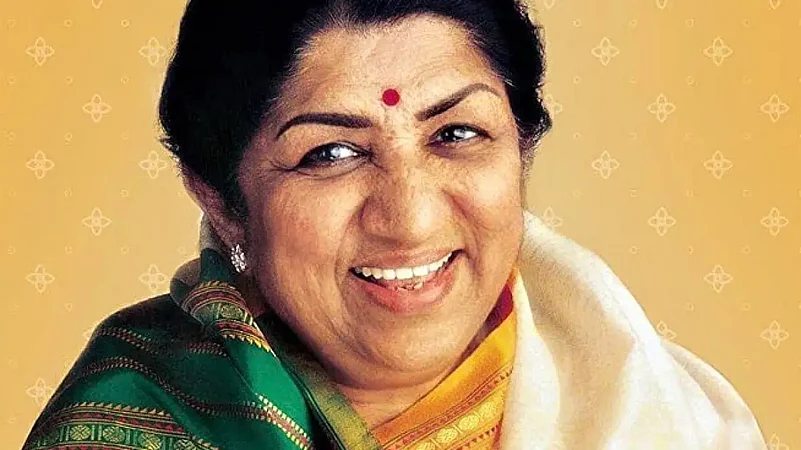It was indeed a marathon six-hour long radio interview, a first, longest ever and last such – given by the legendary Bollywood singer, the late Lata Mangeshkar, to All India Radio, spread in two sessions in September 1999 - January 2000.
Lata Mangeshkar’s 6-Hour Marathon A.I.R. Interview Now In A Book Form
It was indeed a marathon six-hour long radio interview, a first, longest ever and last such – given by the legendary Bollywood singer, the late Lata Mangeshkar, to All India Radio, spread in two sessions in September 1999 - January 2000.

The interviewer was RJ Anirudh Chawla who said “Lataji wanted it to be a tribute to all the people” associated with her since she sang her first playback song in 1945, till 2000, and of course, those who contributed to her long and illustrious musical journey of over 75 years.
“I have now written a book on that interview of Lataji, ‘Tere Sur Aur Mere Geet’, and it will be released on Friday, to coincide with the National Cinema Day being celebrated on October 13,” Chawla said.
The 550-pages magnum opus, described by a veteran music director as an ‘epic’ (‘granth’) includes the free-wheeling A.I.R. interview with the unconquered 'Nightingale of India', four hours in September 1999 and two hours in January 2000, and the government even bent some rules to accommodate it fully.
There are her anecdotes and skirmishes with several legendary personalities, spanning the 110-year long journey of Bollywood black-and-white to the colour era, some selected songs of her with lyrics and over 150 rare, unseen photos from Chawla’s private collection.
After nearly a quarter century, Chawla, recalls how Lataji agreed to do the "extra-long" interview, arriving on the dot for the live broadcast interview at the A.I.R. studio in south Mumbai, patiently answering all questions, smiling, giggling, laughing in her inimitable style, or even an occasional frown.
But, for a change - Lata was only speaking, and even took fan calls during the live broadcast - instead of belting out memorable melodies!
“Actually, there is no major, authoritative book, written on her rich life and times, not even an official biography or autobiography... especially after her passing (Feb. 6, 2022)… I am confident her legion of fans would be waiting for something like this...” Chawla told IANS.
In the marathon tete-a-tete, Lata unabashedly mentioned how her alleged ‘tinny voice’ was once rejected by one of India’s greatest film-makers, Sashadher Mukherjee (of the formidable four-generation Mukherjee clan in Bollywood).
Lata recalled how she was taken by the legendary music director and her ‘godfather’ Master Ghulam Haider, but Mukherjee rejected Lata, saying her ‘baarik’ or thinnish voice would not suit Kamini Kaushal, the heroine of his film “Shaheed” (1948)!
A livid Ghulam Haider then escorted Lata to the railway station, but prophesied to Mukherjee that “one day, this woman (Lata) will become very big, you yourself will chase her” - and it proved to be a bull’s eye.
Pretending to be a die-hard fan of Dev Anand, Lata once called up the evergreen star, raved and gushed over his acting, how she loved his various films, etc..
The unsuspecting but impressed Dev Anand listened to her, and doubting her to be one of his co-stars, interjected a couple of times, “Waheeda, tum ho.. Waheeda?”, but Lata continued her prank for nearly 5-6 minutes, and even sang a song. But, poor Dev Anand became wiser to the caper only much later...!
Lata brought up her famous tiff with another stalwart, Mohammed Rafi on the issue of royalty for singers in the early 1960s, and their differences resulted in both virtually ‘boycotting’ each other for almost three years, creating a musical crisis in the industry.
Finally, one day, the great music director S. D. Burman called them together on a stage during a concert as a rapprochement, and later the Lata-Rafi pair returned to sing together with the memorable “Dil Pukaare, Aa Re Aa Re Aa Re” (‘Jewel Thief’ – 1967).
Interestingly, it was the same S. D. Burman who once got a royal snub when Lata refused to re-record a particular song, and nursing a bruised ego, he practically ignored her for five years while promoting sister Asha Bhosale.
However, ultimately, it was R. D. Burman, who brought together Lata and his father once again together and all was well...
The Greatest Showman, Raj Kapoor also faced her ire after 'Sangam' (1964), in which Lata said she didn’t like the lyrics of the rollicking song ‘Main Ka Karoon Ram, Mujhe Budha Mil Gaya’, so, she never watched the film and also didn’t sing for his next film “Mera Naam Joker” (1970).
As the film industry appeared to panic with yet another temper displayed by the reigning empress of singing, Raj Kapoor somehow managed to mend fences with her, and convinced Lata to return in full bloom for singing all songs in his next venture, 'Bobby' (1973).
?The book has a foreword by Asha Parekh, and the book has been patted by the top film producers, directors, music composers, writers, lyricists, actors-actresses, and of course her co-singers or their kin.
“When I personally went to give the sneak preview copies to many of the living legends, they were thrilled as they never knew or remembered what Lataji had spoken about them so many years ago...” smiled Chawla.
The 52-year-old RJ has hosted popular shows on A.I.R., and other private radio channels for over 25 years, and now is training the gen-next through his ‘RJ Anirudh Chawla Voice Academy’ in Mumbai.
- Previous Story
 Joker: Folie à Deux Review: Joaquin Phoenix and Lady Gaga Can’t Rescue a Flubbed-Experiment Sequel
Joker: Folie à Deux Review: Joaquin Phoenix and Lady Gaga Can’t Rescue a Flubbed-Experiment Sequel - Next Story
























